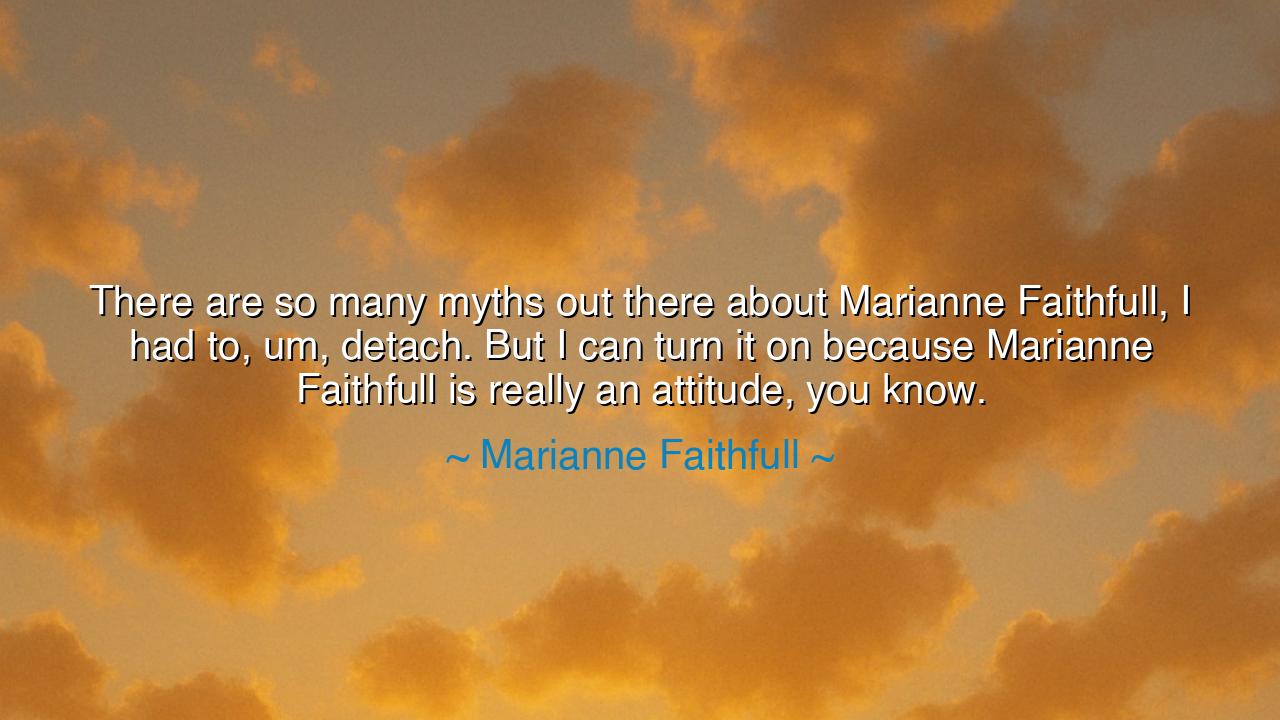
There are so many myths out there about Marianne Faithfull, I had
There are so many myths out there about Marianne Faithfull, I had to, um, detach. But I can turn it on because Marianne Faithfull is really an attitude, you know.






Host: The calm of the evening settled in, the soft glow of the lamp casting a gentle light across the room. Jack sat at the table, his fingers resting lightly on his cup, reflecting on Marianne Faithfull's words. Jeeny stood near the window, her gaze turned inward, considering the layers of meaning behind Faithfull's statement.
Jeeny: “I’ve been thinking about what Marianne Faithfull said: ‘There are so many myths out there about Marianne Faithfull, I had to, um, detach. But I can turn it on because Marianne Faithfull is really an attitude, you know.’ It’s such a powerful reflection on identity, isn’t it? The idea that Faithfull has had to detach from the myths that have surrounded her, but she can still tap into that persona—because, at its core, it's an attitude.”
Jack: “Yes, exactly. Faithfull is showing us that identity isn’t a fixed thing—it’s something that we can shape and adapt. She’s acknowledging how people have projected certain ideas and myths onto her throughout her career. But instead of being defined by those myths, she’s recognized that her true identity isn’t something others can label. It’s something she can choose to embody, something that’s rooted in her attitude and how she chooses to engage with the world.”
Jeeny: “Right. It’s almost like Faithfull is saying that identity is fluid. She had to detach from the stories that people tried to tell about her, the things they believed she should be. But at the same time, she can embrace a certain part of herself—Marianne Faithfull as a persona, an attitude—because that’s part of her own expression. She gets to own it, rather than letting others define it for her.”
Host: The stillness in the room deepened as they both reflected on how identity is often shaped by external forces—expectations, myths, or even projections—but how true empowerment comes from taking control of that identity. Jack’s fingers rested on the table, while Jeeny’s gaze softened, reflecting on how easy it is to let others’ perceptions shape who we are.
Jack: “It makes me think about how we all sometimes get caught up in the myths or labels that others place on us. We may start to believe those projections and lose sight of who we truly are. Faithfull is showing us that authenticity comes from recognizing that we don’t have to live up to other people’s expectations of us. We get to decide who we are, even if that means embracing certain roles or personas that others might impose on us.”
Jeeny: “Exactly. It’s about empowerment—the power to shape and embrace our identity in our own way, even if it means playing with the roles people have given us. Faithfull is saying that identity isn’t something that happens to us; it’s something we actively construct. And sometimes, that construction involves stepping into a persona or attitude when we need it, but always doing so consciously and purposefully.”
Jack: “Yes, and I think it’s also about the tension between public identity and personal identity. People are constantly projecting ideas onto famous figures like Faithfull, but she’s reminding us that those projections don’t have to define who you are. It’s about how you engage with those projections. You can detach from the myths and still take control over how you present yourself to the world.”
Jeeny: “Exactly. It’s a process of reclaiming your own story. Faithfull had to detach from the myths people created about her in order to find her own voice, her own identity. But that doesn’t mean she rejects the persona of Marianne Faithfull—she embraces it as part of her, but on her own terms. It’s about finding the balance between accepting and rejecting the narratives that others try to impose on you.”
Host: The quiet in the room grew deeper as they both reflected on the complexity of identity—how it is shaped by external forces but also how it can be reclaimed and owned. Marianne Faithfull's words had sparked a reflection on the power of embracing both the roles others give us and the ones we create for ourselves. Jack leaned back slightly in his chair, while Jeeny’s gaze turned from the window back to him, both understanding the freedom that comes from self-empowerment.
Jack: “So, Faithfull is showing us that identity isn’t something we just inherit—it’s something we can craft, something we can play with. The persona of Marianne Faithfull might have been shaped by others, but she chooses to own it, to make it hers, to create her own meaning behind it.”
Jeeny: “Exactly. It’s about self-definition—creating a space where you can be who you are, even if that means embracing parts of yourself that others may have misunderstood or projected onto you. Faithfull shows us that we don’t have to be confined by the labels or myths created for us. We can choose who we are and how we present that to the world.”
Host: The evening had fully settled in, the quiet understanding between them a reminder that identity is fluid, something we can create and embrace on our own terms. Marianne Faithfull had reminded them that while the world may project its myths and expectations onto us, the real power lies in detaching from those labels and consciously shaping our own identity. The world outside had darkened, but inside, there was light—a recognition that we are all the authors of our own stories, and we have the power to shape the personas we choose to embody.






AAdministratorAdministrator
Welcome, honored guests. Please leave a comment, we will respond soon